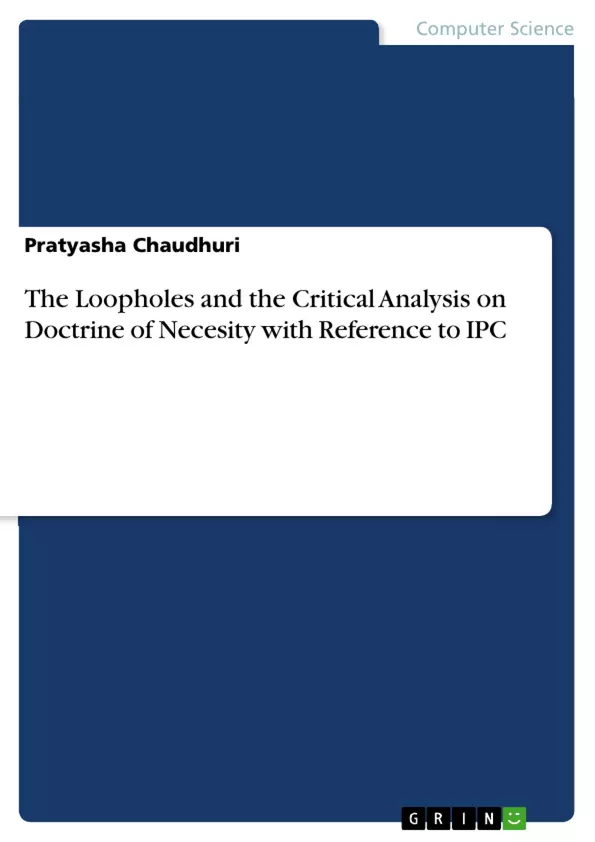The Doctrine of Necessity is a fundamental principle in the Indian Penal Code (IPC) that seeks to balance the strict application of the law with the practical exigencies of real-life situations. This abstract outline an in-depth examination of the Doctrine of Necessity within the context of the IPC. The study aims to elucidate the origins and evolution of this doctrine, its relevance in contemporary legal jurisprudence, and its application in Indian criminal law.
The research delves into notable legal cases and precedents where the Doctrine of Necessity has been invoked, highlighting its significance in providing an exception to criminal liability when actions are taken out of necessity and in the absence of alternative means. Furthermore, the paper explores the doctrinal and jurisprudential underpinnings of this principle, drawing from both Indian and international legal perspectives.
The investigation also scrutinizes the inherent challenges and ambiguities associated with the Doctrine of Necessity, including the subjectivity of what constitutes necessity and the potential for misuse or abuse. Additionally, it will discuss the ongoing debates and critiques surrounding this doctrine, assessing its limitations and proposing possible improvements or clarifications.
By offering a comprehensive analysis of the Doctrine of Necessity in the Indian Penal Code, this research project aims to contribute to a better understanding of the legal principles governing exceptions to criminal liability in situations of necessity, thus aiding in the development of a more just and equitable legal system.
Table of Contents
- Abstract
- Introduction- Doctrine of Necessity
- Protection against greater harm - The Doctrine of Necessity under the Indian Penal Code (IPC), 1860
- Immediate and Imminent Threat
- Example of a Landmark Case
- Doctrine of necessity
- Need of Necessity
- LOOPHOLES OF THE DOCTRINE OF NECESSITY
- Imminent Treat of the Doctrine
Objectives and Key Themes
This research paper delves into the Doctrine of Necessity in the Indian Penal Code (IPC), examining its origins, evolution, contemporary legal application, and significance in providing an exception to criminal liability. It aims to understand the legal principles surrounding exceptions to criminal liability in situations of necessity and propose improvements for a more just and equitable legal system.
- The origin and evolution of the Doctrine of Necessity
- The application of the Doctrine of Necessity in contemporary legal jurisprudence
- The Doctrine of Necessity as an exception to criminal liability
- Challenges and ambiguities associated with the Doctrine of Necessity
- The concept of proportionality within the Doctrine of Necessity
Chapter Summaries
- The abstract introduces the Doctrine of Necessity and its relevance in the Indian Penal Code, outlining the paper's objective and scope.
- The introduction defines the Doctrine of Necessity and explains its role in the IPC. It also references relevant sections of the IPC that encompass the principle of necessity, such as Section 81, 82, and 83, but notes the absence of a specific section dedicated to the doctrine.
- This chapter explains the Doctrine of Necessity and its application in preventing greater harm. It outlines key conditions for applying the doctrine, including imminent danger, the absence of alternative options, proportionality, public good, and the absence of malicious intent.
- This chapter focuses on the concept of "immediate and imminent threat" as it relates to the Doctrine of Necessity. It clarifies the meaning of immediate and imminent threats and provides an example of a situation where the doctrine might apply.
- This chapter presents a landmark case study, State of Uttar Pradesh v. Sitaram, where the Doctrine of Necessity was invoked to justify the actions of a police officer. It highlights the facts of the case, the issue at hand, the court's judgment, and its significance in establishing a precedent for justifying law enforcement actions taken without a warrant under urgent circumstances.
- This chapter defines the Doctrine of Necessity as a legal concept that allows for otherwise illegal actions in situations of compelling necessity. It also discusses the principle of natural justice, "Nemo in propria causa judex, esse debet," and its relevance to the doctrine.
- This chapter delves into the necessity of the Doctrine of Necessity, emphasizing the need for immediate danger and the necessity to choose the lesser of two evils. It also clarifies that the accused must prove that the action was proportionate to the harm avoided.
- This chapter examines the loopholes of the Doctrine of Necessity, specifically addressing the possibility of abuse, lack of clarity in standards for proportionality, and the potential for overreach. It explores the potential consequences of these issues, including the threat to the rule of law and the lack of accountability.
Keywords
This research paper focuses on the Doctrine of Necessity, its application in the Indian Penal Code (IPC), its limitations, and its potential for abuse. Key concepts include contemporary legal jurisprudence, criminal liability, inherent challenges, ambiguities, debates, critiques, and the need for clarification in the application of this principle.
- Arbeit zitieren
- Pratyasha Chaudhuri (Autor:in), 2024, The Loopholes and the Critical Analysis on Doctrine of Necesity with Reference to IPC, München, GRIN Verlag, https://www.hausarbeiten.de/document/1471856


